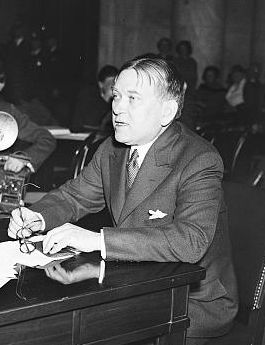
Let’s face it. When you think of journalists covering the Scopes trial, you don’t think of Joseph Wood Krutch writing for The Nation, you don’t think of Frank Kent writing for the Baltimore Sun, you don’t think of Westbrook Pegler writing for the Chicago Tribune. You think of H. L. Mencken, writing for the Baltimore Evening Sun and for The American Mercury, the monthly magazine that he and George Jean Nathan founded in 1924, the year before the Scopes trial. And that’s not surprising: by 1925, Mencken enjoyed a national reputation as a fiery iconoclast: “the most powerful influence on this whole generation of educated people,” as Walter Lippmann called him in 1926. He reveled in the opportunity afforded by the Scopes trial to revile the mores of the South. So prolific was he in covering the trial, and so compelling were his stories, that as late as 2006 a 206-page collection consisting of his Scopes coverage was published.
Ironically, Mencken missed his chance to cover the biggest story associated with the Scopes trial. On Friday, July 17, 1925, after Judge Raulston ruled that the testimony of the defense’s expert witnesses would not be heard by the jury, Mencken concluded: “All that remains of the great cause of the State of Tennessee against the infidel Scopes is the final business of bumping off the defendant.” And with that, he took himself back to Baltimore—thereby failing to witness the spectacle, on the following Monday, June 20, 1925, of Clarence Darrow interrogating William Jennings Bryan about the Bible on the lawn outside the courthouse. (Plagued by the scorching heat in the era before air conditioning and worried about ominous cracks in the courthouse, Judge Raulston decided to take the proceedings al fresco.) Missing Bryan’s testimony was a deprivation, Mencken later admitted, “that I have always regretted heartily.”
Five days after the close of the trial, Bryan was dead. Having loathed him for years, Mencken was not inclined to let bygones be bygones. Privately, he exclaimed, “We killed the son-of-a-bitch!” and joked, “God aimed at Darrow, missed, and hit Bryan instead.” His obituary, which appeared in the July 27, 1925, Baltimore Evening Sun, was hardly less restrained. Mencken portrays Bryan as in decline at the Scopes trial: mangy, lisping, and bitter. He wasn’t willing to concede that there was ever any good in his subject, writing, “Bryan was a vulgar and common man, a cad undiluted. He was ignorant, bigoted, self-seeking, blatant and dishonest. ... He seemed only a poor clod like those around him, deluded by a childish theology, full of an almost pathological hatred of all learning, all human dignity, all beauty, all fine and noble things. He was a peasant come home to the dung-pile. Imagine a gentleman, and you have imagined everything that he was not.”
Brilliant in its cruelty and cruel in its brilliance, the obituary had a substantial afterlife of its own. Mencken reworked it for the October 1925 issue of The American Mercury, and it appeared as “In Memoriam: W. J. B.” in his Prejudices: Fifth Series (1926) and his A Mencken Chrestomathy (1949) as well as in various compilations of his writings, such as The Vintage Mencken (1959), edited by Alastair Cooke, and The American Scene (1965), edited by Huntington Cairns, and in various collections of essays. (You would not be wrong to form the conclusion that I have been spending entirely too much time with Mencken bibliographies recently.) What I didn’t know, until reading Marion Elizabeth Rogers’s Mencken: The American Iconoclast (2005) recently, is that on the day that the obituary was published, it provoked such a strong reaction in Baltimore that the author was forced to revise it after the first edition of the newspaper hit the streets.
As Rogers tells the story, Edwin Murphy, the managing editor, “caught a glimpse of Mencken’s article and hit the ceiling,” calling for the presses to be stopped. “Stop press” is today a metaphor indicating that there’s new information that needs to be considered, but in the days of linotype, it wasn’t a metaphor. Murphy was taking a drastic (and costly) action in response to what he considered a grave problem—correctly, Rogers implies: readers were already cancelling subscriptions and advertisers were already pulling their notices. Mencken was summoned from home. Arriving, “[h]e seized an extra copy of the Evening Sun and, taking a pencil from his coat pocket, began marking up his own column with quick jabs. ‘Here,’ he said ... ‘Send this up to the editorial office.’ Then, his face mottled, Mencken pushed through the [revolving] doors, leaving them spinning.” Further editions of that day’s newspaper apparently contained the revised version of the obituary.
How was it revised? I don’t know for sure, because I wasn’t able to find the revised version, but Rogers writes that “whole paragraphs and sentences had been excised” from it as well as the description of Bryan as “a peasant come home to the dung-pile. Imagine a gentleman, and you have imagined everything that he was not” and the phrase “a political charlatan of the worst type without principle and without honor.” (Puzzlingly, though, I don’t see the latter phrase, or even the word “charlatan,” in the original version of the obituary at all; the version of the obituary in The American Mercury describes Bryan as “a charlatan, a mountebank, a zany without shame or dignity,” but not as “a political charlatan.”) Privately, Mencken was none too pleased by the managing editor’s decision, but he never complained of the censorship publicly. Perhaps there was no need, since, after all, it was his preferred version that became a classic in the annals of vituperation.

